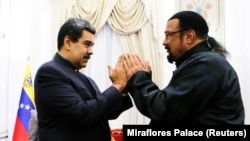On November 21, Venezuela held regional and municipal elections. In the majority of gubernatorial and mayoral races, candidates with ties to President Nicolas Maduro won. Turnout was reportedly 42 percent.
European Union observers monitored the vote, the first EU Election Observation Mission (EOM) to visit Venezuela in 15 years.
On November 29, Maduro alleged the EU election observers were spies.
"The delegation of the EU spies did not find a single reason to castigate the electoral system,” Russia’s TASS state news agency quoted Maduro as saying. “It was a delegation of spies, not international observers. They moved freely throughout the country, spying on social, economic and political life.”
Both claims are false.
It was Maduro who invited the EOM in the first place. The EU agreed, but only after certain conditions were met, among them a Venezuelan government pledge that opposition parties would be part of the process.
“We did not send an EOM to observe last year’s legislative elections because the necessary conditions were not met,” wrote Josep Borrell, High Representative of the EU for Foreign Affairs and Security Policy, in a blog post published on the EU’s External Action Service website.
“This time, we accepted the demand from the Venezuelan National Electoral Council to send an EOM, once we got confirmation of the participation of the main opposition parties, which meant that these elections would be more inclusive than the previous ones to which the opposition did not participate.”
The EOM noted improvements in Venezuela’s electoral system, stating that the country’s new Electoral Council was “the most balanced in 20 years.”
The Maduro government not only invited the EOM but negotiated a deal to give the EU observers access as requested.
Responding to the allegations of spying, Borrell wrote:
“Although Nicolas Maduro has declared recently that the EU EOM members were ‘spies’ who had come to discredit the elections, the fact that the mission was well-received by a vast majority of Venezuelans on the ground and that they responded positively to its preliminary statement, suggests that the decision to go and observe was the right one.”
Borrell also criticized news media for asking the EOM to state whether the election was free or fair, saying EU observers are not “election cops.”
“We were not there to legitimize or de-legitimize an election and to declare whether it was free and fair,” Borrell wrote.
“The EU EOMs are designed to provide objective findings on how an electoral process is run, based on international democratic norms that the country has signed up to. And it forms the basis of a set of recommendations that can help improving future electoral processes.”
While Maduro claimed that the EU monitors did not find “a single reason to castigate the electoral system,” they in fact noted numerous irregularities. For example, pro-government candidates won 20 out of 23 gubernatorial races despite the majority of votes going to the opposition. Borrell said this was partially due to the opposition’s failure to unite around one candidate, thus splitting their votes.
The other concerns cited by the EU observers who monitored the Venezuelan election included the lack of judicial independence, use of state resources for political campaigning, arbitrary disqualification of candidates and government control over the media.
The United States, the EU and about a dozen Latin American countries do not recognize Nicolas Maduro as Venezuela’s president or the results of its most recent parliamentary elections, held in 2020.
Maduro assumed power in Venezuela after the death of self-proclaimed socialist leader Hugo Chavez in 2013.





